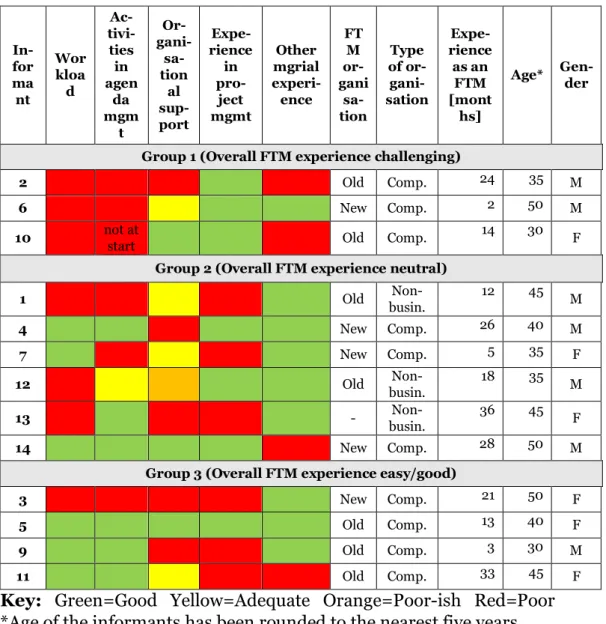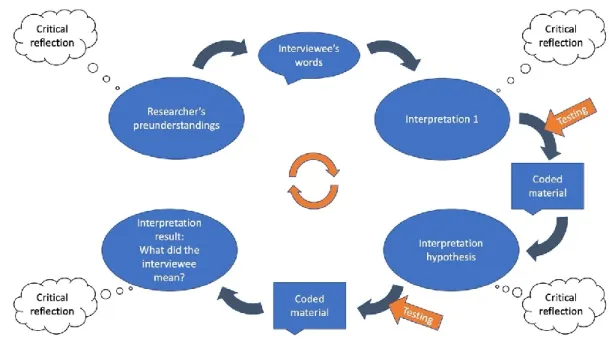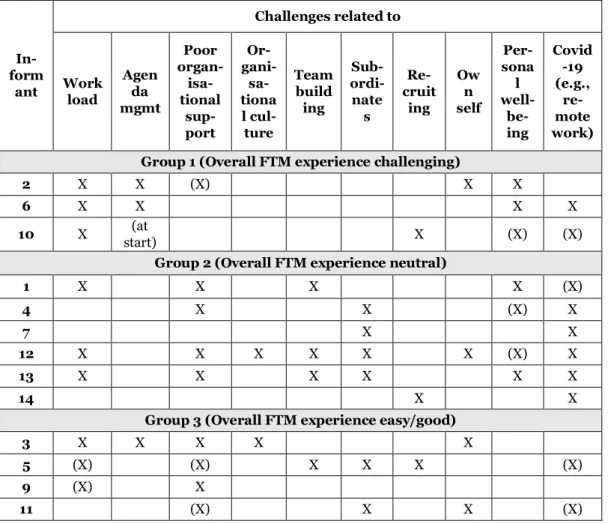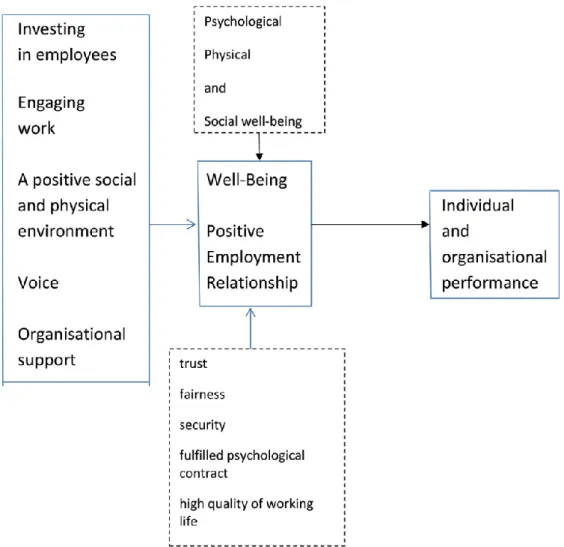Title of thesis Becoming a manager – Challenges, well-being and Covid-19 Program Industrial Engineering and Management. In this chapter, I will present the research to date on how to become a manager, as well as on well-being.
Becoming a manager
Identity work of first-time managers
Interestingly, Maurer and London (2018) identified that in innovative organizations the role transition can have different degrees. In her original work, Hill (2019) found that the FTMs only began to grasp their new identity after 6–9 months. 2019) states that time is significant for identity work.
First-time managers in technical fields
However, as Bolander et al. 2019), note that this is normal and also beneficial as it promotes learning. These degrees are "incremental, substantial, and radical" (ibid. p.1426), all of which relate to the extent to which individuals assume a new identity. 2019) that the experience of becoming a leader varied between participants, implying that the transition to a leadership role is at least somewhat unique.
Challenges first-time managers face
Overall, the effects of the Covid-19 pandemic have been uneven and people have experienced it differently. Several studies have also been done regarding the impacts of the Covid-19 pandemic on managers.
Well-being
- Definition of well-being
- Well-being at work
- Well-being and first-time managers
- Well-being and managers during the Covid-19 pandemic
Van den Broeck et al. 2010) have argued that some job demands could also act as stimulating challenges that contribute to greater work engagement and well-being. Bergin's (2009) descriptions of how FTMs began to care for their well-being can be interpreted as the FTMs shaping their job characteristics, i.e. the job demands and resources they had.
Preunderstandings
Researcher’s background
Second, my previous education is an Automotive Electronics Engineer (BEng) degree from the Metropolia University of Applied Sciences (UAS), which counts as my bachelor's degree in the IEM studies. This means that as an automotive engineer I already had full competence as an engineer and also some work experience from my field.
Researcher’s personal view on people
In addition, I worked as an automotive engineer for a car magazine for almost two years, often interviewing people. Some guidance is needed to get good data from an interview.
Biases
Second, I would like to note that I believe that in some contexts people need guidance and instructions, and in my opinion an interview represents this kind of setting.
Sampling and informants
Sampling
In order to find good data on the subject of FTM, it made sense to ask people from the training program to join the study, as they were likely to be or have recently been in the process of becoming an FTM. Also due to participation in the educational program, they were in a way on a similar starting point.
Informants
Finally, by volunteering to participate in the study, we could ensure that they would be willing to share their experiences.
Interviews
Interview themes
Interview techniques and tips
Conducting the interviews
Secondary data
Analysis process
First round analysis and coding
I also found that it was not easy to create a unified coding system from the beginning, so some codes ended up being very close to each other, but I tackled this by recoding the first three interviews.
Grouping
Synthesis and conclusions
To answer the research question about FTM challenges, I began by examining similarities and differences within and between groups in the challenges they faced during their FTM process and how they addressed them. They also include observations that could help both parties think critically about the FTM process.
Final note on the research methods
I did this with all the informants and then began to summarize and compare their experiences. At the end, I will present the findings about the well-being of the informants in the process of becoming a manager.
Overall experiences of becoming a manager
Comparing the groups
Second, the difficulty of the FTM role may be related to the overall experience of becoming a leader. In group 3, three out of four informants dealt with managing the agenda, and one tried to improve in this.
Encountered challenges
- Challenges faced by group 1
- Challenges faced by group 2
- Challenges faced by group 3
- Challenges faced by several groups
- Summary of challenges faced
In addition, one informant explained how there had been challenges with managing distance due to her organization operating in a multinational environment. Additionally, one informant also described how her dependents had had challenges with well-being due to the Covid-19 measures in society.
Ways to overcome challenges
- Ways to overcome the challenges in group 1
- Ways to overcome the challenges in group 2
- Ways to overcome the challenges in group 3
- Ways to overcome the challenges faced by several groups
- Summary of ways to overcome the challenges
In addition, the informants, who had no prior knowledge of the people in their organizations, followed the people around them themselves and began to 'gather' the missing information. He also mentioned that he thinks the lowering of the bar due to the pandemic is more acceptable.
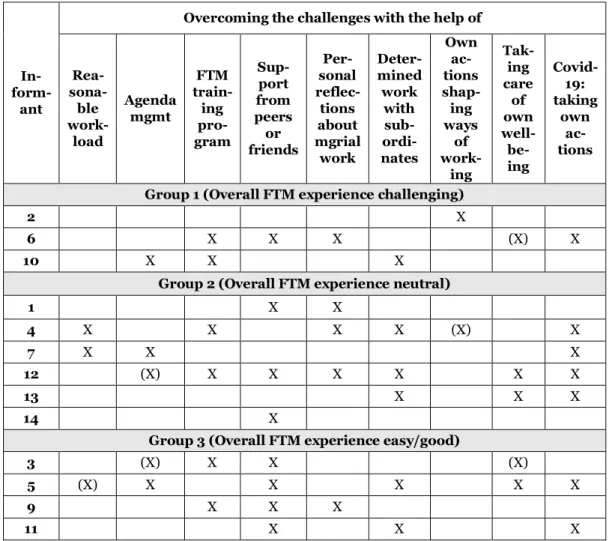
Note on organisational support for FTMs
On the other hand, the worst support experiences seemed to have taken place with informant 13, 3 and 2. Informant 1, quote 46. Some candidates who apparently received good organizational support said that they would have needed more, e.g. informant 5 with the collective agreements.
Well-being of the FTMs
- Well-being in the three overall experience groups
- Threats for well-being
- Well-being and the Covid-19 pandemic
- Summary of well-being
Three informants who mentioned their organization's culture supporting their well-being and work-life balance were in groups 2 and 3. Only one informant mentioned organizational measures to support employee well-being during telework and isolation.
Summary of findings
On the other hand, among all informants, most of the informants had to deal with the Covid-19 pandemic, workload, lack of organizational support (which makes sense since all informants came from an FTM training program they had participated in to receive more support than their organization provided), and personal well-being. I also argue that, especially in the long term, it will be essential to identify and combat potential threats to well-being.
Failing first-time managers?
First, I will discuss the findings regarding the overall experience of becoming a manager, as well as the challenges I face and ways to overcome them. It can be argued that grouping the informants into three groups based on their overall experience when they became managers offered some preliminary insights into what factors contribute to a better FTM experience.
Challenges first-time managers face
Challenges related to the Covid-19 pandemic
A minor challenge one of my informants had faced was a short-term recruitment ban in the early days of the pandemic. Another theme that was visible to some extent among my informants was work expansion and the lack of support to cope with the consequences of the pandemic (Ipsen et al., 2022).
Identity work of FTMs
They also write about uncertainty due to the non-linear progression of the pandemic, which was also reported by my informants. A concrete example of the effects that identity work can have can be brought by comparing the experiences of two informants.
Ways to overcome challenges
Role of support for FTMs
Indirect organizational support and external training programs as well as the timing of the support are also discussed (Plakhotnik, 2017). It should also be noted that the interviews did not ask about the timing of the organizational support the informants had received, so no exact conclusions can be drawn about this matter.
Well-being of FTMs
Job demands–resources theory and FTMs
The requirements and resources of FTMs can be to some extent universal, but also quite unique depending on, for example, the organizational context. All my informants described actions that count as labor processing; they consciously changed the demands and resources of their work (or life) to maintain or improve well-being.
The Covid-19 pandemic and the well-being of FTMs
One of them had suffered a burnout as an FTM, but luckily now seemed to be on the right track. The way he worked out his process also seemed to emphasize the long-term nature of getting well after a burnout: he gradually changed his behavior and also tried to introduce meaningful activities in his spare time.
Recommendations about becoming a manager
Recommendations for individuals
Since the transition to a management role is challenging, one must be prepared to take care of one's well-being during this process. Additionally, it would be helpful to consider how big of a change you would need to make in your professional life.
Recommendations for organisations
In addition, the organization could offer support for the individual's well-being, such as training or counseling. In general, organizations should and could also promote the well-being of FTMs by helping them manage their work characteristics through job design (Bakker and de Vries, 2021).
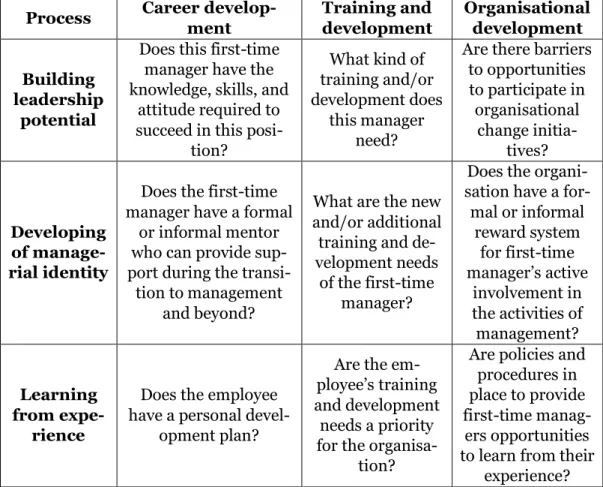
Limitations
- Sampling and informants
- Interviews
- Biases
- Methodological limitations
However, in these cases the cameras were at the beginning and at the end of the interviews. This means that the richness of the data obtained from the limited but diverse group can be harnessed.
Paths for future research
Probably another time, some answers of the informants would be different, but nevertheless I consider them to be true and real for them at the time of the interviews of this study. Finally, as with all qualitative research, the results of this study are “interpretations” (Laine, 2018, pp. 37–38) of the words the informants used to describe their experiences.
Self-evaluation
Explores the components of career well-being and the emotions associated with significant career experiences. A critical review of the definition of "wellness" for physicians and their patients in a post-Covid-19 era.
Original interview quotes in Finnish
Ainakin tuolla tasolla oli tukea, sinä et, minulla oli luottamusta johdolta - - Ja vaikka oli vaikeita tilanteita ja asioita, joita aina ajattelee jälkikäteen, et olisi voinut hoitaa sitä paremmin, ei ollut paljon paineita. Vaikka henkilökohtaisella tasolla et ehkä saanut -- tukea -- kyllä, oli tukea organisaatiolta -- Se oli kuitenkin iso juttu.
Interview data
Pre-interview form
Interview structure
Covid-19 timeline
Summary of the main challenges faced by whistleblowers (less common challenges are marked with (X)). As explained earlier, working remotely due to the Covid-19 pandemic was a common denominator of cluster 2 challenges. Another informant reported that he cared more about well-being because of the FTM training program and his experiences during the Covid-19 pandemic.
Summary of key ways to overcome challenges from whistleblowers (less common are marked with (X)). Another factor related to the generalizability as well as the reliability of the results is the fact that the informants were at different stages of their FTM processes.
